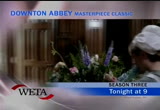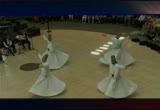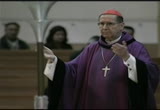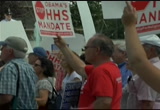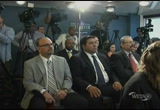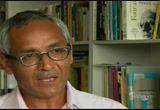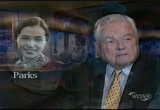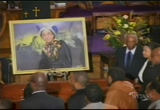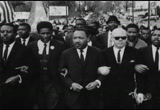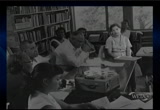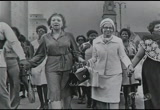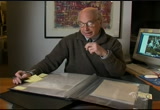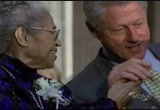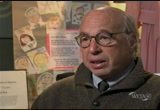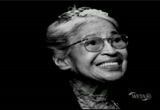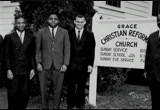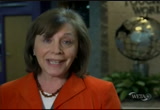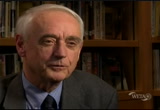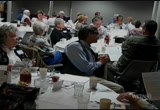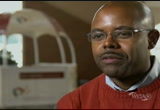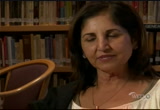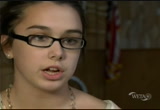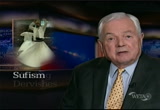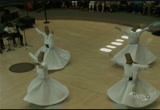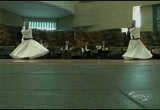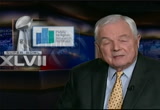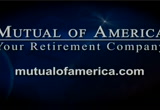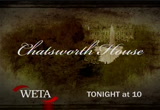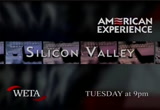tv Religion Ethics Newsweekly PBS February 3, 2013 10:30am-11:00am EST
10:30 am
coming up, david tereshchuk on the lifelong activism of rosa parks, who would have been 100 years old next week. also, judy valente reports on the city long known for its religious conservatism that spent all last year fostering interfaith understanding. and sufi whirling dervishes at washington's smithsonian institution. welcome.
10:31 am
welcome. i'm bob abernethy. it's good to have you with us. a dramatic development this week in the catholic church's sex abuse crisis. prominent retired cardinal roger mahony was stripped of his public and administrative church duties in los angeles amid widespread criticism of how he covered up allegations of child sex abuse by priests. l.a.'s current archbishop jose gomez took the unprecedented step as the archdiocese began releasing internal documents which revealed the extent to which
10:32 am
mahony worked to protect the church from the abuse scandal. gomez said the behavior described in the files was "sad and evil." mahony has issued several apologies for his actions. advocates for sex abuse victims called this a largely symbolic move. but church experts say it's the first time in the crisis that any action has been taken against such a high-ranking church official. the obama administration announced a new attempted compromise with religious groups friday in the ongoing dispute over the controversial "contraception mandate" in the healthcare law. under the new proposed rules, faith-based nonprofit employers with religious objections would not have to cover free contraceptive services for their employees. instead, the insurer or another third-party would provide the coverage at no cost to either
10:33 am
the employee or the nonprofit. the new rules would widen the number of groups exempted from the mandate, although religious for-profits would still have to comply. some religious groups said they were satisfied with the new rules, but others remained concerned. the u.s. catholic bishops said they are studying the proposal. also this week, president obama made a strong push for comprehensive immigration reform this week, as did some members of the senate, who presented their own bipartisan plan. faith groups across the religious spectrum praised both efforts, saying legislation should be passed without delay. in recent months, religious leaders have led an aggressive campaign for immigration reform. >> for us, for many of us who are here, that immigration is part of a consistent life ethic
10:34 am
that respects the human person. meanwhile, as congress heard testimony on gun violence from former congresswoman gabrielle giffords and others, prominent members of the faith community continued to advocate for stricter gun laws. african-american clergy from around the country gathered in washington and urged that more attention be paid to gun violence in urban areas. in addition to stronger gun control, they lobbied for federal resources for community anti-violence programs. >> we all as clergy leaders and faith leaders expressed that we believed that was a moral imperative, for us to act. just before they retreated, the militants attacked the
10:35 am
treasured ancient manuscripts. >> the international community was outraged by reports that the departing militants had ransacked a major library and torched it, destroying some of the documents. outside experts spent the week trying to confirm what had happened. at the university of cape town, professor shamil jeppie leads a project to study the texts. he says the majority appear to have been saved. >> the manuscripts were moved out of timbuktu, we are told. this is the latest news from timbuktu, that 25,000-odd manuscripts were actually quietly moved in the past nine months from timbuktu to the capital. >> reporter: timbuktu was considered an ancient seat of islamic learning.
10:36 am
its collections include texts on theology, math and science, as well as history and politics. when militants took over the city last april, they imposed a strict version of sharia law and began destroying historic sites, including centuries-old sufi shrines that they deemed to be idolatrous. many scholars fled the city, but before they left, jeppie says they apparently hid what manuscripts they could. >> the images we see of manuscripts damaged and burnt and so on are very few, very few, maybe as many as 2,000. that is bad enough, but not the kind of damage and destruction we heard of previously. >> reporter: jeppie hopes scholars can now get back to their work in timbuktu, uninterrupted by violence. i'm kim lawton reporting. now, remembering the late rosa parks, the civil rights heroine who, in 1955, triggered the montgomery, alabama, bus boycott. she would have turned 100 on
10:37 am
monday, february 4th. mrs. park's defiance made her a national legend, the tired seamstress who refused to give up her seat on a segregated bus. but her story is much more complex. scholars would like to study rosa parks' papers, but it turns out they are unavailable for public view. david tereshchuk is our correspondent. >> reporter: when rosa parks died just over seven years ago, prominent national figures celebrated her as the ordinary citizen who herself achieved fame by transforming the cause of civil rights through one simple act. a black woman in montgomery, alabama, refusing to give up her seat on the bus to a white man. but many of mrs. parks' admirers believe her true nature has not been fully recognized since her death. for one thing, too little account is taken, they think, of her strong involvement in the
10:38 am
african methodist episcopal church. that involvement, says author of a new parks biography, jeanne theoharis, was matched with a deep faith that called her to action. >> it is a faith that requires people to act in the world. and that december day she makes this incredible stand. >> the driver demanded the seats that we were occupyin the other passengers there reluctantly gave up their seats. but i refused to do so. and there is no way to understand how she makes that stand, how she keeps going, without understanding at the core of her activism is her faith. >> reporter: mrs. parks' trial, for disorderly conduct and violating a local segregation ordinance, sparked the epoch-making montgomery bus boycott, led most notably by a then little-known dr. martin luther king jr., but also by other local ministers. >> from the time of the arrest the word had gotten around over montgomery. the ministers were very much interested in it, and we had our
10:39 am
meetings in the churches. >> she felt that the church had a responsibility to be active and certainly she was proud of the way that it did so. >> reporter: indeed mrs. parks was to become a deaconess in the ame church. she said that it was in her church that, "i learned people should stand up for their rights, just as the children of israel stood up to the pharaoh." >> you know, she is locked in american history as the "bus woman," the woman who wouldn't move on the bus. so that was -- that was her contribution to the struggle for racial justice. in point of fact, she had a long life after that and before that where she did many things that were couge were courageous and brave. >> reporter: while her protest on that day in 1955 may have been spontaneous, mrs. parks had been attending antisegregation l,evoted at the famous adtleipo ersh traing afor trerde r nionists and civil rights workers. and as time went on, rosa parks' own political views could surprise people.
10:40 am
>> the radical rosa parks. just putting that name "radical" with rosa parks shakes you because you're thinking about this sweet little woman who wouldn't move on the bus. she was to the left of the political spectrum. she was ahead of dr. king on many issues. >> malcolm x is her personal hero, and her views on self-defense are much closer to malcolm x's than king's. she is also active in the black freedom movement as it grows and changes. in 1966 stokely carmichael comes to give a big speech, and one of the first things he does from the pulpit is he calls out rosa parks and he calls her his hero. there's a beautiful picture of stokely carmichael and rosa parks, and i think we're not used to seeing that. >> reporter: we might have gotten used to seeing such unexpected aspects of rosa parks except for one curious fact -- parks' own records of her life are simply not accessible to public view.
10:41 am
that's because of a dispute between family members and executors she appointed in her later years, and a probate court ordered that all her possessions should be sold, with the money that's raised being split between the contending parties. so the entire rosa parks collection has passed into the care of a new york auction house, one that's well-known for celebrity auctions. >> the rosa parks archive contains her library, unpublished photographs, correspondence with everyone from family to great leaders. >> reporter: it's all that correspondence, of course, plus her private writing over time in journals and notes that scholars would dearly love to examine closely. >> i just noticed something written when she was referring to her being age 10 where she is crying out about the injustices that she saw around her. i could almost turn to any page and come up with something that's certainly
10:42 am
umgoebosp-raising for me, and ib think for anyone. this one starts, "i would rather be lynched than live to be mistreated." >> reporter: the problem is, this tantalizing collection has not sold and it's remained unsold for five years. one reason is that more than just papers are involved. for such a famous and much-loved historical figure as rosa parks, it's poignant, to say the least, that all her possessions should end up in this workaday warehouse in upper manhattan. across about a thousand square feet, there are boxes and boxes of rosa parks' memorabilia, ranging from documents and photographs, right through to really personal items like her jewelry and her dresses. >> this is a two-piece outfit that she wore when she got the congressional medal. there's the dress that she wore for her 85th birthday celebration. >> reporter: the court has mandated that the entire collection should be sold
10:43 am
together as one piece -- both papers and personal effects. and as such, in the auction world it could command an enormous asking price. >> we thought to put a price tag of $10 million on this archive. >> reporter: historians are appalled that universities and institutes devoted to african-american history, who seem a natural home for the collection, will not be able to afford such a large amount. >> i mean, this puts it out of the reach of some of the institutions that mrs. parks cared tremendously about. >> reporter: the auctioneers are now suggesting they could perhaps put together a rich philanthropic donor with any organization that considers itself an appropriate custodian, but feels it doesn't have the money. >> i would certainly encourage anyone who felt that way to contact us to see if there wasn't some creative way that we could assist them to make it happen. if they have the will and it's the right kind of institution maybe we can make some
10:44 am
suggestions that would produce the way. >> reporter: in the meantime, though, with no willing philanthropist coming forward, dedicated followers of rosa parks' remarkable story will just have to wait to discover full chapter-and-verse of a life still untold in its entirety. and they are convinced that the current fate of her papers is doing a great disservice to their heroine. >> it wouldn't sit right with the parks who was active in the world, who had this responsibility to be active and to be useful in the world, and that's not about how much money you have or what you can afford. >> i think she would be horrified. i think she'd be amazed to find out that money stands in the way of the public knowing more about her. >> reporter: for "religion & ethics newsweekly", i'm david tereshchuk. the city of grand rapids, michigan, long ago became known as a place of strict dutch
10:45 am
reformed calvinism. so in 2012, it was something of a surprise when grand rapids organized a year-long series of events all designed to promote interfaith understanding. by all accounts, the campaign was a great success, as judy valente reports. >> reporter: grand rapids, michigan, is a city with deep roots in conservative calvinist christianity -- a place where dancing and card-playing were once banned, mowing the lawn on sunday was frowned upon into the 1960s, and in more recent years, a professor who taught evolution at calvin college encountered harsh criticism. though the dutch reformed church and its more conservative offshoot, the christian reformed church, is still a strong presence here, grand rapids today is also home to 82 catholic parishes, 5 mosques, 2 synagogues, and hindu, buddhist and sikh temples. interfaith dialogue would have been considered unacceptable by
10:46 am
many here in the past. but in the last year, with support from the mayor and a wide range of community leaders, grand rapids has held 250 events aimed at deepening interfaith understanding. the effort resulted in some strange sights like this one -- a muslim imam preaching on christian scripture at the sunday morning service to a united church of christ congregation. >> if we can make this kind of thing happen in grand rapids, then i think that can be a model for it happening in other communities and really a model for the nation. >> reporter: grand rapids has become a microcosm of global religious diversity. its interfaith project is unique because it includes not only churches and religious organizations, but a public university, the art museum, the community theater, even the local newspaper. "the grand rapids press" publishes weekly columns on interfaith understanding. the museum is exhibiting salvador dali's prints of "the
10:47 am
12 tribes of israel." and the symphony has hosted a number of events, like this performance of a stephen paulus oratorio commemorating the holocaust. leaders of the effort took pains to reassure religiously conservative groups that delving into other religions doesn't risk diluting any one religion's set of beliefs. >> one concept that i think is important, particularly for our community, is the difference between what i call "thin" dialogue and "thick." thin dialogue is where you try to get people to narrow their faith commitment down so thin that they can agree with everybody else. karen armstrong says, "all religions are basically compassion." hans coomb says, "all religions are basically the golden rule." and there's a place for that. there's a place for seeing where the commonality is, but in this community with the strong religious traditions, the strong religious commitments on the part of individuals and
10:48 am
organizations, we've talked about thick interfaith dialogue. bring the thickness of your faith to the table. talk about all that you believe. don't see how thin you can make your belief but talk about the thickness of your belief, but do it in a spirit of understanding and a willingness to the other person to bring their thickness of their faith to it as well. >> reporter: a major goal is to build deeper interpersonal relationships through efforts like the tuesday table talks, regular dinner meetings between jewish, christian and muslim couples that take place in a catholic spirituality center. the tuesday table talks were an eye opener for derek atkins, who grew up in a church that discouraged exploring other faiths. >> it was kind of one of those church settings where you kind of stuck with your own, you know, if you're a christian then you should hang out with christians. >> reporter: but at the dinners -- >> i was amazed at the generation that was there and to look now and see, because of this movement here, that they're saying, "wow, there's such value in these conversations."
10:49 am
>> reporter: at first some residents questioned having public institutions participate in interfaith activities. >> there was a little bit of resistance from some of my secular colleagues at the university. they said, "what's the state university doing promoting faith?" i said, "no, we're not promoting faith. we're not even promoting interfaith. we're promoting understanding." >> reporter: and not all religious groups reacted enthusiastically. rev. kyle ray is pastor of kentwood community church in suburban grand rapids. >> i think there is a danger with going overboard in interfaith dialogue. there's the great potential for universalism where we begin to believe that all roads lead to the same place. the reality is that if you would talk to major religious leaders, jesus makes some exclusive claims that can kind of muddy the water when it comes to interfaith dialogue. >> it's quite the opposite of putting other faiths down. if you're solid in your faith, then it doesn't have to be necessarily the only way or
10:50 am
truth. it could be a clear truth for us, and we can be solid in it, but then have other people be solid in their faith. >> reporter: city officials estimate that as many as 30,000 of grand rapids' 189,000 residents have attended interfaith events this past year. community activist ghazala munir says the city has come a long way since her two children were the only muslims in their school. in the 1990s, she tried to establish an interfaith group for mothers, but ran into resistance from other muslims. >> people were not really -- they were not ready. they didn't trust. >> reporter: but now she's part of a muslim-christian-jewish group called "sisters of faith." >> and so we meet once a month and we discuss ideas and we have speakers and we read different books. there's just an amazing sort of a camaraderie there. it seems to me that no matter what you believe, it all comes out to be the same, our dreams, our hopes, our fears are all the same. so really there's no separation then. once you come to that level, that you start talking in these tones, then there is no
10:51 am
separation, we connect right away. >> reporter: in the coming year, the focus will be on the younger generation. these high school students are learning about the peace process that ended decades of sectarian violence in northern ireland. many in the room have pledged to cooperate on social service projects with students of other faiths, or start interfaith clubs at their schools. >> the area i live in has a strong calvinist influence and is very, very religious. like we're referred to as the bible belt sometimes, so i think bringing the things that i learn in this group to my area can really help people become more tolerant and open to different things. >> we don't even have a cultural group at my school. so i think it would be cool to bring that into my school and educate other kids about the different religions that are out there and just let them to at least have a different perspective of even just what they've grown up in. >> i think it's the high school students that are ready for this and they're the ones who have
10:52 am
the most to gain by true interfaith understanding. >> reporter: while fewer large scale public events are planned for this year, grand rapids' interfaith dialogue will go forward with a variety of smaller individual projects, led largely by the generation about to come of age. for "religion & ethics newsweekly", i'm judy valente in grand rapids, michigan. ♪ like other major religions, islam has its own mystical branch, called sufism, which teaches many ways to experience spiritual union with the divine. one of those paths -- dating from the 13th century -- is dance, specifically the dancing of those known as whirling dervishes, who were followers of the poet rumi. recently, the smithsonian institution in washington had a symposium on sufism, that
10:53 am
included dervishes from turkey. our guide was manjula kumar, a smithsonian program manager. >> there are stories about the origins of the whirling dervishes and one of the stories is rumi was walking towards, just walking down and he heard the call for prayer and he was so overwhelmed, he was almost in an ecstasy to hear the call for prayer that he started moving around and he called it a divine ecstasy. and since then his followers started making this whirling. it's creating an atmosphere to pray and it's an offering i think it's just a physical way
10:54 am
of expressing this love for the divine and that's how they kind of twirl and in the whirling it becomes a meditation. it's an ecstatic state, but over the years it's become an art form. they do not call it a performance. i would not call it a performance. it is a spiritual offering. this became a symbol of believing in beyond religion, beyond the rituals, beyond the fundamental beliefs of islam. it continues to evolve, it continues to grow, but i want to just make a very clear distinction that everyone today will say sufism, the term, is not a religion, it is a philosophy, a belief and the commonalities, whether one is a
10:55 am
muslim, a hindu, a jew or a sikh or a christian, the commonality is the looking for love, peace, harmony of coming together in unison as a voice. finally this super bowl weekend, does god have a stake in the outcome? according to a new poll from the public religion research institute, almost 30% of americans say they think god plays a role in determining which teams win games. half say they approve of athletes who publicly thank god. and more than half say they believe god rewards faithful athletes with good health and success. that's our program for now. i'm bob abernethy. you can follow us on twitter and facebook and watch us anytime on the pbs app for iphones and ipads.
10:56 am
there's always much more on our website. you can comment on all of our stories and share them. audio and video podcasts are also available. join us at pbs.org. ♪ major funding is providing by the lily endowment, an minnesota-based private foundation. additional funding also provided by mutual of america. designi designing cmiusto customized in and group products, and the corporation for public broadcasting.
126 Views
IN COLLECTIONS
WETA (PBS) Television Archive
Television Archive  Television Archive News Search Service
Television Archive News Search Service 
Uploaded by TV Archive on

 Live Music Archive
Live Music Archive Librivox Free Audio
Librivox Free Audio Metropolitan Museum
Metropolitan Museum Cleveland Museum of Art
Cleveland Museum of Art Internet Arcade
Internet Arcade Console Living Room
Console Living Room Books to Borrow
Books to Borrow Open Library
Open Library TV News
TV News Understanding 9/11
Understanding 9/11